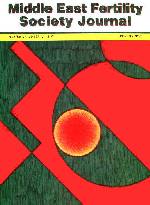
|
Middle East Fertility Society Journal
Middle East Fertility Society
ISSN: 1110-5690
Vol. 13, Num. 1, 2008, pp. 67-67
|
Middle East Fertility Society Journal, Vol.
13, No. 1, 2008, pp. 67-67
EVIDENCE-BASED MEDICINE CORNER
Acupuncture for Infertility: A recently released
evidence
Hesham Al-Inany, M.D.
Code Number: mf08015
Clearly the consultant gynecologist
has never bothered to become acquainted with Chinese scientific literature this
past 3 decades. Acupuncture has been used in China for centuries to regulate
the female reproductive system.(1) Three potential mechanisms for its effects
on fertility have been postulated.(2) Firstly, acupuncture may mediate the
release of neurotransmitters,(3) which may in turn stimulate secretion of
gonadotrophin releasing hormone, thereby influencing the menstrual cycle,
ovulation, and fertility.(4) Secondly, acupuncture may stimulate blood flow to
the uterus by inhibiting uterine central sympathetic nerve activity.(5) Thirdly,
acupuncture may stimulate the production of endogenous opioids, which may
inhibit the central nervous system outflow and the biological stress
response.(6)
Recently,
systematic review has been conducted to determine whether acupuncture given
with embryo transfer improves live birth rates among women undergoing IVF.
Seven trials with 1366 women undergoing in vitro fertilization were included in
the meta-analyses. Trials with sham acupuncture and no adjuvant treatment as
controls were pooled for the primary analysis. Complementing the embryo
transfer process with acupuncture was associated with significant and
clinically relevant improvements in clinical pregnancy (odds ratio 1.65, 95%
confidence interval 1.27 to 2.14; number needed to treat (NNT) 10 (7 to 17);
seven trials), ongoing pregnancy (1.87, 1.40 to 2.49; NNT 9 (6 to 15); five
trials), and live birth (1.91, 1.39 to 2.64; NNT 9 (6 to 17); four trials).
A possible explanation
to these finding is that If acupuncture does work by modulating the balance of
endogenous opioids , and it opens a gate to apply to fertility patients to
improve outcomes by disinhibiting cAMP activity and, perhaps also reduce the
sense of stress felt by so many of these couples by disinhibiting dopamine
release.
REFERENCES
- Maciocia
G. Obstetrics and gynecology in Chinese medicine. New York: Churchill
Livingstone, 1997.
- Chang
R, Chung PH, Rosenwaks Z. Role of acupuncture in the treatment of female
infertility. Fertil Steril 2002;78:1149-53.
-
Mayer
DJ, Price DD, Rafii A. Antagonism of acupuncture analgesia in man by the
narcotic antagonist naloxone. Brain Res 1977;121:368-72.
- Ferin
M, Vande Wiele R. Endogenous opioid peptides and the control of the menstrual
cycle. Eur J Obstet Gynecol Reprod Biol 1984;18:365-73.
- Stener-Victorin
E, Waldenstrom U, Andersson SA, Wikland M. Reduction of blood flow impedance in
the uterine arteries of infertile women with electro-acupuncture. Hum Reprod
1996;11:1314-7.
- E.
Manheimer, G. Zhang, L. Udoff, A. Haramati, P. Langenberg, B. M Berman, and L.
M. Bouter. ‘Effects of acupuncture on rates of pregnancy and live birth among
women undergoing in vitro fertilization: systematic review and meta-analysis’
BMJ 2008; 0: bmj.39471.430451.
-
Han,
J S. Chen, X H. Sun, S L. Xu, X J. Yuan, Y. Yan, S C. Hao, J X. Terenius, L.
Institution Effect of low- and high-frequency TENS on Met-enkephalin-Arg- Phe
and dynorphin A immunoreactivity in human lumbar CSF. Pain. 47(3):295-8, 1991
Dec.
©Copyright 2008 - Middle East Fertility Society
|
